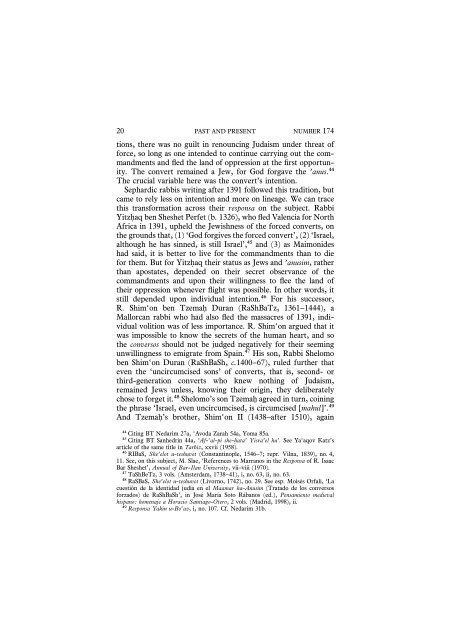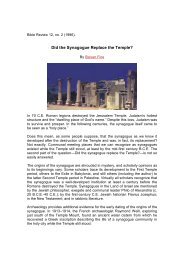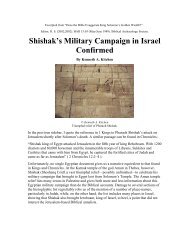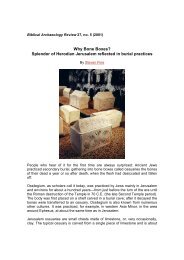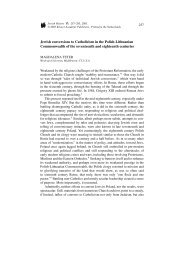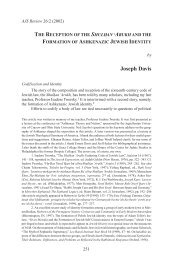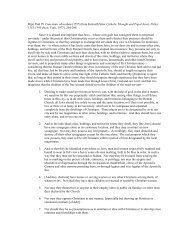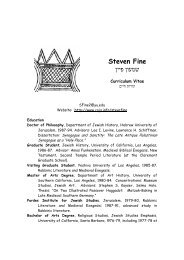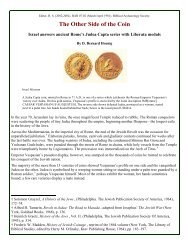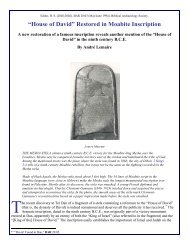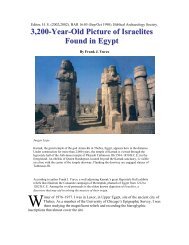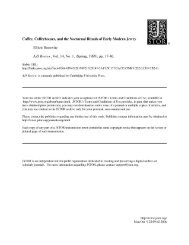jews and christians in fifteenth-century spain
jews and christians in fifteenth-century spain
jews and christians in fifteenth-century spain
Create successful ePaper yourself
Turn your PDF publications into a flip-book with our unique Google optimized e-Paper software.
20 PAST AND PRESENT NUMBER 174<br />
tions, there was no guilt <strong>in</strong> renounc<strong>in</strong>g Judaism under threat of<br />
force, so long as one <strong>in</strong>tended to cont<strong>in</strong>ue carry<strong>in</strong>g out the comm<strong>and</strong>ments<br />
<strong>and</strong> fled the l<strong>and</strong> of oppression at the first opportunity.<br />
The convert rema<strong>in</strong>ed a Jew, for God forgave the ]anus.44<br />
The crucial variable here was the convert’s <strong>in</strong>tention.<br />
Sephardic rabbis writ<strong>in</strong>g after 1391 followed this tradition, but<br />
came to rely less on <strong>in</strong>tention <strong>and</strong> more on l<strong>in</strong>eage. We can trace<br />
this transformation across their responsa on the subject. Rabbi<br />
Yitzh1aq ben Sheshet Perfet (b. 1326), who fled Valencia for North<br />
Africa <strong>in</strong> 1391, upheld the Jewishness of the forced converts, on<br />
the grounds that, (1) ‘God forgives the forced convert’, (2) ‘Israel,<br />
although he has s<strong>in</strong>ned, is still Israel’,45 <strong>and</strong> (3) as Maimonides<br />
had said, it is better to live for the comm<strong>and</strong>ments than to die<br />
for them. But for Yitzh1aq their status as Jews <strong>and</strong> ]anusim, rather<br />
than apostates, depended on their secret observance of the<br />
comm<strong>and</strong>ments <strong>and</strong> upon their will<strong>in</strong>gness to flee the l<strong>and</strong> of<br />
their oppression whenever flight was possible. In other words, it<br />
still depended upon <strong>in</strong>dividual <strong>in</strong>tention.46 For his successor,<br />
R. Shim[on ben Tzemah1 Duran (RaShBaTz, 1361–1444), a<br />
Mallorcan rabbi who had also fled the massacres of 1391, <strong>in</strong>dividual<br />
volition was of less importance. R. Shim[on argued that it<br />
was impossible to know the secrets of the human heart, <strong>and</strong> so<br />
the conversos should not be judged negatively for their seem<strong>in</strong>g<br />
unwill<strong>in</strong>gness to emigrate from Spa<strong>in</strong>.47 His son, Rabbi Shelomo<br />
ben Shim[on Duran (RaShBaSh, c.1400–67), ruled further that<br />
even the ‘uncircumcised sons’ of converts, that is, second- or<br />
third-generation converts who knew noth<strong>in</strong>g of Judaism,<br />
rema<strong>in</strong>ed Jews unless, know<strong>in</strong>g their orig<strong>in</strong>, they deliberately<br />
chose to forget it.48 Shelomo’s son Tzemah1 agreed <strong>in</strong> turn, co<strong>in</strong><strong>in</strong>g<br />
the phrase ‘Israel, even uncircumcised, is circumcised [mahul]’.49<br />
And Tzemah1’s brother, Shim[on II (1438–after 1510), aga<strong>in</strong><br />
44 Cit<strong>in</strong>g BT Nedarim 27a, [Avoda Zarah 54a, Yoma 85a.<br />
45 Cit<strong>in</strong>g BT Sanhedr<strong>in</strong> 44a, ]Af-[al-pi she-h1ata] Yisra]el hu]. See Ya[aqov Katz’s<br />
article of the same title <strong>in</strong> Tarbiz, xxvii (1958).<br />
46 RIBaS, She]elot u-teshuvot (Constant<strong>in</strong>ople, 1546–7; repr. Vilna, 1839), no. 4,<br />
11. See, on this subject, M. Slae, ‘References to Marranos <strong>in</strong> the Responsa of R. Isaac<br />
Bar Sheshet’, Annual of Bar-Ilan University, vii–viii (1970).<br />
47 TaShBeTz, 3 vols. (Amsterdam, 1738–41), i, no. 63, ii, no. 63.<br />
48 RaSBaS, She]elot u-teshuvot (Livorno, 1742), no. 29. See esp. Moisés Orfali, ‘La<br />
cuestión de la identidad judía enelMaamar ha-Anusim (Tratado de los conversos<br />
forzados) de RaShBaSh’, <strong>in</strong> José María Soto Rábanos (ed.), Pensamiento medieval<br />
hispano: homenaje a Horacio Santiago-Otero, 2 vols. (Madrid, 1998), ii.<br />
49 Responsa Yak<strong>in</strong> u-Bo[az, i, no. 107. Cf. Nedarim 31b.


